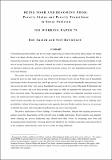Being Poor and Becoming Poor: Poverty Status and Poverty Transitions in Rural Pakistan
Abstract
Conventional poverty profiles and poverty status regressions are often criticised by policy makers for telling
them a lot about who the poor are, but very little about what to do to combat poverty. Essentially this is
because the correlates of poverty status are distinct from the dynamic processes that lead households to fall
into or escape from poverty. This paper contrasts the results of conventional poverty status regressions with
an alternative approach, the analysis of poverty transitions, using a five year longitudinal household survey
from rural Pakistan.
The results show that while the incidence of income poverty in the sample villages was high, turnover
among the poor was also rapid. In each year of the survey between 21 per cent and 29 per cent of households
had incomes below the poverty line, but 46 per cent to 51 per cent of poor households exited poverty from
one year to the next. Only 3 per cent of households were poor in all five years of the panel. Furthermore, the
correlates of entries and exits from poverty were found to differ in important but unexpected ways from
those of poverty status. The dependency ratio and geographic variables were important correlates of poverty
status, but neither had much impact on entries into or exits from poverty. Other variables, such as education
and livestock ownership, had asymmetric impacts on poverty transitions: increasing exit or reducing entry
probabilities without influencing transitions in the opposite direction. Further analysis, however, is necessary
to identify the events which preceded households moving into or out of poverty.
The policy implications of these findings, if confirmed elsewhere, indicate that targeting anti-poverty
policies using the characteristics of the currently poor is highly problematic. If governments care primarily
about reducing the poverty headcount, they should focus their efforts on increasing exits from and
decreasing entries into poverty. Focusing anti-poverty efforts on the correlates of poverty status means that it
is the symptoms rather than the causes of poverty that are being addressed.
Citation
Baulch, B. & McCulloch, N. (1998) Being Poor and Becoming Poor: Poverty Status and Poverty Transitions in Rural Pakistan, IDS Working Paper 79, Brighton: IDS.Is part of series
IDS working papers;79Library catalogue entry
http://bldscat.ids.ac.uk/cgi-bin/koha/opac-detail.pl?biblionumber=113631Rights holder
Institute of Development StudiesCollections
- IDS Research [1671]

